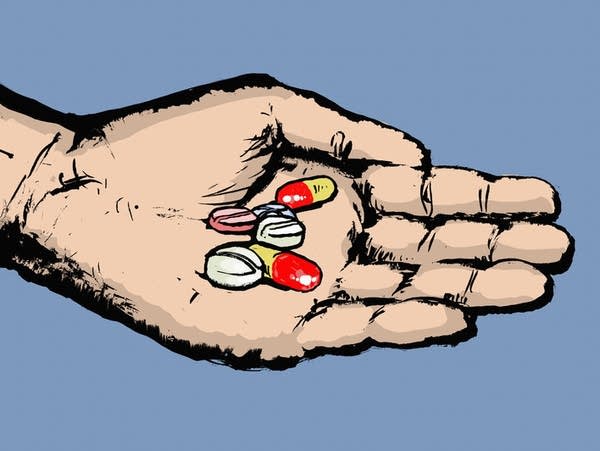Dayton wants Big Pharma to fund Minnesota's anti-opioid battle

Updated: 5:30 p.m. | Posted: 11:20 a.m.
Gov. Mark Dayton on Wednesday laid out a broad plan to tackle Minnesota's opioid crisis, including a significant increase in funding for prevention and treatment, and a penny-a-pill fee paid by drug companies to cover costs.
The officials called out the pharmaceutical industry for creating the crisis, and urged drug companies to support the legislative efforts.
Create a More Connected Minnesota
MPR News is your trusted resource for the news you need. With your support, MPR News brings accessible, courageous journalism and authentic conversation to everyone - free of paywalls and barriers. Your gift makes a difference.
Opioids are a family of drugs that include everything from illegal heroin to prescription painkillers like Oxycontin. At least 395 people died of opioid overdoses last year in Minnesota, which was an 18 percent increase over the previous year.
The centerpiece of the governor's proposals is a "stewardship fee" required of opioid manufacturers of one cent per milligram of opioids in a pill. Fully implemented, it would be expected to raise about $20 million a year.
"It was opposed last year by the drug companies, whose products have caused this epidemic and continue to fuel this expansion," Dayton said. "Those ongoing efforts should not be paid by Minnesota taxpayers, but rather by the people who created this problem."
The idea had some bipartisan support on Wednesday. Rep. Dave Baker, R-Willmar, acknowledged that a fee on industry could be controversial to some in his caucus.
"Something needs to be done. People are dying," Baker said. "For this issue today, this is the best option for us to help fix this problem."
The country has been slow to come together on this issue of opioids, he said, because it came from the trusted medical community. Baker, whose son Dan died of an opioid overdose in 2011, said Minnesota now has the opportunity to lead the country in dealing with this epidemic
The industry group Pharmaceutical Research and Manufacturers of America employs five lobbyists at the state Capitol, according to state records.
Nick McGee, a spokesperson for the industry group said in an emailed statement that the penny-a-pill bill ignores factors other than prescription painkillers that led to the opioid epidemic.
"This tax would unfairly penalize and ostracize vulnerable patients who legitimately rely on these prescribed medicines to treat serious, debilitating and sometimes fatal conditions," McGee said.
McGee said Pharmaceutical Research and Manufacturers of America are open to working with stakeholders including policy makers to help address the opioid crisis.
The maker of the painkiller OxyContin, Purdue Pharma, employs one lobbyist at the state Capitol. The company didn't respond to a request for comment.
State Sen. Chris Eaton, DFL-Brooklyn Center, described the penny-a-pill fee plan as "reparations" from drug companies. Eaton's daughter Ariel Eaton-Willson died of a heroin overdose in 2007.
"Whether their intention was to addict the populace or not, that's what happened," Eaton said. "Like many parents who have lost children to this, I'm pretty angry about that. And I don't see any reason why the taxpayers should have to pay to fix this."
Dayton said funding for the anti-opioid proposals would be covered by state funds in fiscal 2019 and then covered by penny-a-pill revenue.
State officials noted opioid overdose deaths rose 66 percent between 2010 and 2016. Similar increases have been reported nationwide.
Lexi Reed Hultom of the Steve Rummler Hope Network lost her fiance to an opioid overdose in 2011. She said the country is on a "dangerous trajectory."
U.S. Senator Tina Smith also announced Wednesday that she'll propose a bill similar to the "penny-a-pill" legislation that would require drug companies to pay for solutions to the opioid epidemic at the federal level.